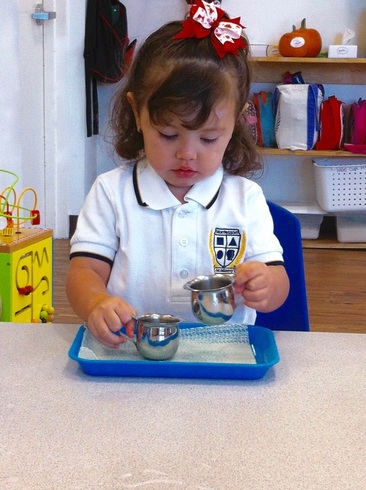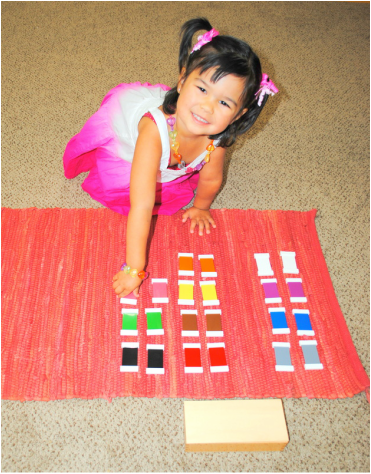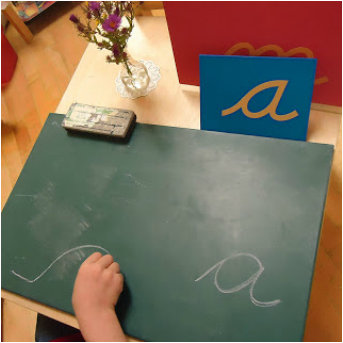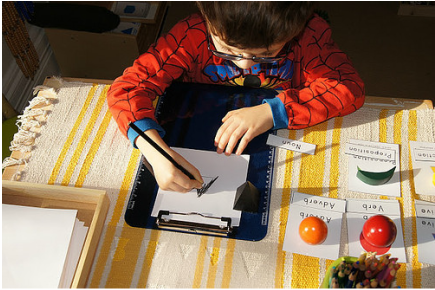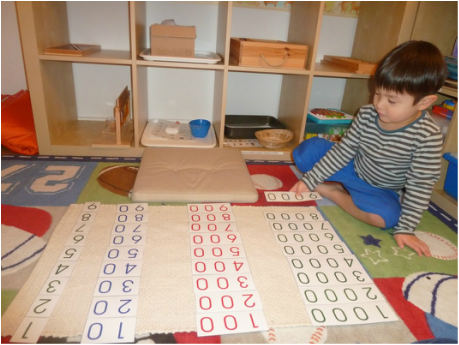Discovery Montessori Curriculm
The hallmark of a Montessori program is the prepared classroom environment. Each classroom is equipped with beautiful, well made materials that allow children to explore and discover specific educational concepts, all through the uses of their senses. As they are guided by their teachers, coupled with their natural sense of curiosity, the children's reading, writing, advanced mathematics, problem solving, geography, science and cultural studies naturally flourish and develop. Visual arts, music and movement are also interwoven through out the days’ activities.
The attractive, hands-on, child-sized materials, carefully selected and placed on shelves at the child's eye level, facilitate and encourage children to view and select them. Many of the materials have a control of error built into their design. Children can see and learn from their own errors without relying on a teacher to point them out. This is one of the many beautiful aspects of a Montessori classroom that fosters independence, self-discovery, and positive self-esteem.
The attractive, hands-on, child-sized materials, carefully selected and placed on shelves at the child's eye level, facilitate and encourage children to view and select them. Many of the materials have a control of error built into their design. Children can see and learn from their own errors without relying on a teacher to point them out. This is one of the many beautiful aspects of a Montessori classroom that fosters independence, self-discovery, and positive self-esteem.
The Areas of a Montessori Classroom
Practical Life: |
The Practical Life exercises are organized into three main areas: Care of the Person, Care of the Environment, and Grace and Courtesy. The vast array of exercises in each area provide purposeful activity, develop motor control and coordination, develop independence, concentration, and introduce children to the concept of responsibility. Large and small muscle coordination and development will be refined, enabling a child to have control over his/her movements. The Practical Life area also provides important, fundamental building blocks enabling children to complete future, more complex activities within the Montessori environment. |
Sensorial: |
Maria Montessori viewed the senses as the "doorway to the mind." She considered sensory and manipulation not only an aid to the development of maturing sense organs (eyes, ears, nose, tongue and skin) but as a starting point for intellectual growth. The basic sensorial exercise inspires careful observation - the mind must judge, compare, classify and draw conclusions. Sensorial Materials allow for individual work and repetition, and allow children to clasify their sensorial impressions in an organized, orderly, and scientific manner. The materials have a built in control of error, which builds in the child the habit of working independently, without fear of making mistakes, becoming comfortable and at ease in the fact that errors are not seen as a negative aspect, but rather natural to the process of learning. Sensorial exercises and materials teach children about color, shape, sound, taste, smell, dimension, texture, weight, volume, temperature and form. Much like the Practical Life exercises, the sensorial materials are strongly connected to the rest of the Montessori curriculum, with everyday discovery and exploration. |
Language:
|
Mathematics
|
The Montessori Mathematics curriculum is a powerful learning tool for developing a strong foundation in math. Dr. Maria Montessori realized that all children have a “Mathematical Mind” and that when they are given the opportunity to explore math in a concrete way, through “hands-on” materials, abstract math concepts become easier to comprehend. She created her Mathematics and Sensorial curriculum based on the Decimal Numeral System, also know as the Base Ten Mathematical system. All Montessori Mathematics materials are based on abstract concepts and create concrete learning materials that children use independently.
The Montessori Mathematics program creates a concrete foundation of math skills that are invaluable for future learning. The Montessori Math materials cover recognition of math patterns, addition, subtraction, multiplication, division, short and long, fraction work and skip counting, all by the age of 6! |
